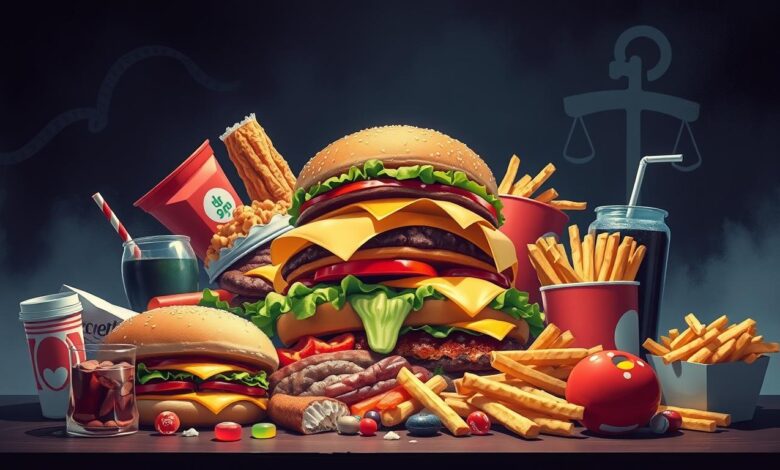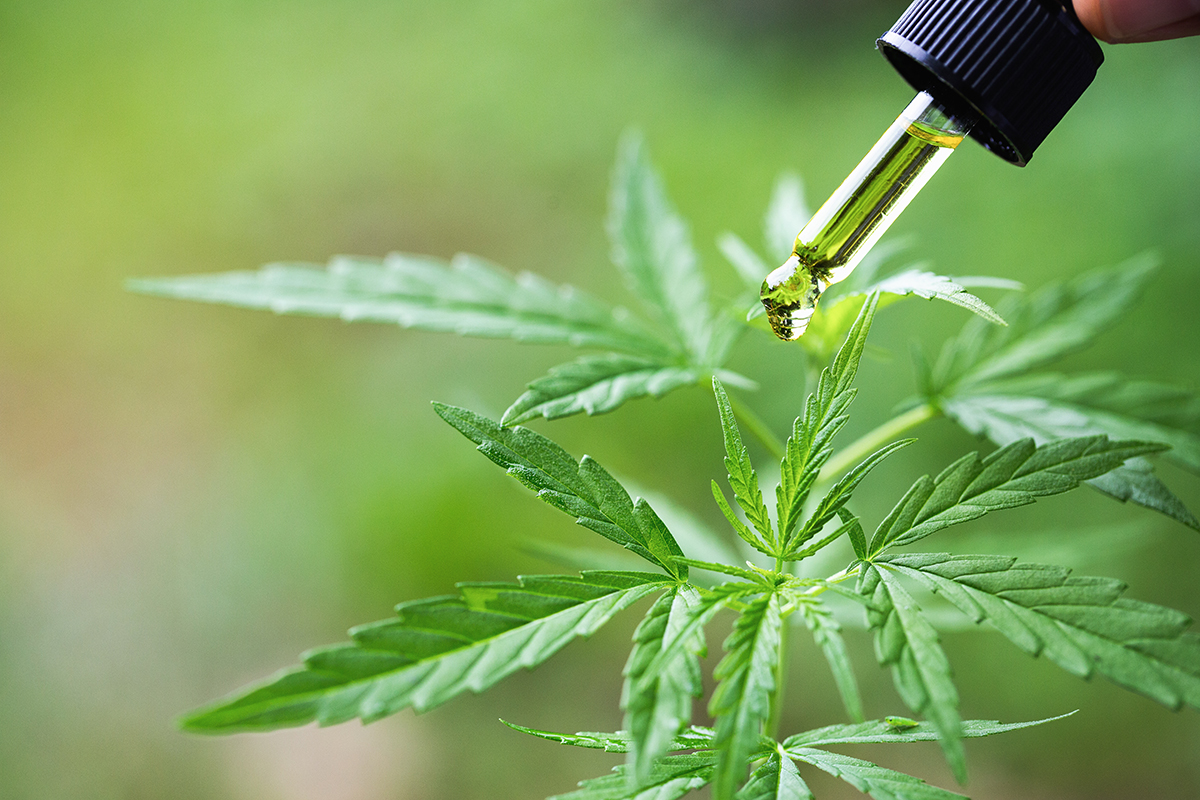
Top 10 Things Junk Food Does to Our Body
Between 2013 and 2016, a huge 36.6% of U.S. adults ate fast food daily. For kids and teens, it was even worse at 36.3% from 2015 to 2018. These numbers show how common junk food is in America and its effects on our health.
Junk food is often full of fat, sugar, and calories. This can lead to many health problems. These include gaining weight, obesity, heart disease, diabetes, and even mental health issues. We’ll look at the top 10 ways junk food harms our bodies. We’ll see why choosing healthier options is so important.
1. Weight Gain and Obesity
Junk food is a big reason for weight gain and obesity. These foods are full of unhealthy fats, added sugars, and processed carbs. They can cause us to eat too many calories and gain weight. Junk food is easy to get and cheap, but it’s bad for our health in the long run.
How Junk Food Contributes to Weight Gain
Junk food is high in empty calories. These calories give us energy but don’t give us the nutrients we need. Eating these foods can lead to eating too much and gaining weight fast. Our genes and the addictive nature of junk food also play a big part in the rise of obesity.
The Role of Empty Calories
Junk food is full of added sugars, unhealthy fats, and refined carbs. These foods don’t have the vitamins, minerals, or fiber our bodies need. This means they can cause weight gain and problems with metabolism, as our bodies can’t use these calories well.
Long-term Impact on Obesity Rates
The increase in junk food and obesity is a big worry for public health. Being obese is linked to many health problems, like high blood pressure, type 2 diabetes, and heart disease. Obesity from junk food can have serious long-term effects. It’s important to choose healthier foods to keep a good weight and lower the risk of chronic illnesses.
| Obesity-Related Health Risks | Percentage Increase in Risk |
|---|---|
| Cardiovascular Disease | 64% |
| Type 2 Diabetes | 282% |
| Hypertension | 49% |
| Gallbladder Disease | 109% |
2. Increased Risk of Heart Disease
Eating too much junk food can lead to a higher risk of heart disease. Trans fats in many processed and fried foods are the main culprits. These fats can increase your bad cholesterol levels. This can cause plaque to build up in your arteries, raising your risk of heart attack and stroke.
Junk foods are also packed with sodium, which can cause high blood pressure. Just one bacon cheeseburger from a fast-food place can have all the sodium you need for the day. This can harm your blood vessels over time, making you more likely to get heart failure, heart attack, and stroke.
But it’s not just about trans fats and sodium. Junk foods are often high in calories and low in essential nutrients. This can lead to weight gain and obesity, which are big risks for heart disease.
The facts are clear: eating less junk food and more whole, nutrient-rich foods can help protect your heart. It can also lower your risk of serious heart problems.
3. Type 2 Diabetes and Insulin Resistance
Eating junk food can lead to type 2 diabetes and insulin resistance. Foods like bagels, buns, and breaded items have a lot of processed carbs. These can make it hard for your body to control blood sugar levels.
Sugar Overload and Insulin Spikes
When we eat foods with lots of refined carbs and added sugars, our body quickly turns them into glucose. This causes a spike in blood sugar. The pancreas then releases a lot of insulin to lower the sugar levels.
But, this cycle can harm the pancreas over time. It can lead to insulin resistance and type 2 diabetes.
The Link Between Junk Food and Insulin Resistance
Being overweight, especially around the belly, increases the risk of insulin resistance and type 2 diabetes. Junk foods are often full of calories, unhealthy fats, and processed carbs. This can make you gain weight and lead to insulin resistance.
This means your cells have a hard time responding to insulin. So, your blood sugar levels stay high.
Long-term Health Risks of Type 2 Diabetes
If type 2 diabetes is not treated or managed well, it can lead to serious health problems. These include a higher risk of heart disease, stroke, kidney disease, nerve damage, and vision loss.
It’s important to prevent or manage type 2 diabetes. You can do this by eating healthier, staying active, and getting medical advice when needed.
| Junk Food to Avoid | Healthier Alternatives |
|---|---|
| Desserts, candy, and soda | Whole fruits, plain Greek yogurt, and unsweetened sparkling water |
| Fruit juice and dried fruit | Fresh fruits and vegetables |
| Refined starches (white rice, white bread) | Whole grains (brown rice, whole-wheat bread) |
| High-fat dairy products | Low-fat or non-fat dairy options |
| High-fat meats | Lean proteins (chicken, fish, legumes) |
| Fried foods | Baked, grilled, or roasted options |
4. Digestive Issues and Gut Health
Junk food can really harm our digestive system and gut health. It messes with the balance of our gut bacteria, leading to many digestive problems.
How Processed Foods Disrupt Gut Bacteria
Our gut is filled with trillions of good bacteria, known as the gut microbiome. These bacteria are key for digestion, absorbing nutrients, and keeping us healthy. But, junk foods with lots of sugar and artificial stuff can upset this balance. This leads to more bad bacteria and fewer good ones.
The Impact of Junk Food on Digestive Enzymes
Junk food can hurt how our body makes and uses digestive enzymes. These enzymes help break down food and get nutrients from it. Junk food’s high fat and sugar can make our digestive system work too hard. This can cause bloating, gas, and trouble digesting some foods.
Common Digestive Problems Linked to Junk Food
- Constipation: Junk foods are low in fiber and high in fat, which can slow down digestion and cause constipation.
- Diarrhea: Some junk food ingredients, like artificial sweeteners or too much fat, can make you have diarrhea.
- Heartburn and Acid Reflux: Junk foods that are high in fat and spicy can irritate the esophagus, causing heartburn and acid reflux.
- Irritable Bowel Syndrome (IBS): Junk food’s processed ingredients and lack of fiber can make IBS symptoms worse, like stomach pain, bloating, and changes in bowel habits.
Knowing how junk food affects our digestion helps us make better food choices. This can help keep our gut healthy and improve our overall well-being.
5. Mental Health Implications
Eating junk food harms not just our bodies but also our minds. It can lead to serious mental health issues. Studies link a diet full of processed foods to a higher chance of depression.
The Connection Between Diet and Depression
Research shows eating a lot of junk food and mental health is linked to more depression. Foods high in fats, sugar, and refined carbs can mess with our brain chemicals. This can make us feel anxious, stressed, and down.
How Junk Food Affects Cognitive Function
The brain uses a lot of energy, even though it’s just a small part of our body. Eating a lot of cognitive function-harming junk foods can hurt our thinking skills. These foods can make our memory worse, shorten our attention span, and slow down our thinking.
The Role of Nutrient Deficiencies in Mental Health
- Gut bacteria help us absorb nutrients and connect our brain and gut. A diet low in vitamins and antioxidants can upset this balance. This can lead to mental health problems.
- Not eating enough foods rich in omega-3s, B vitamins, and magnesium can make depression and other mood issues worse.
We can take steps to protect our mental health by choosing better foods. Eating more whole foods and less junk food and mental health-harming processed foods helps our brains and feelings. This can make us feel better overall.
6. Skin Problems and Premature Aging
The saying “you are what you eat” is very true for our skin’s health. Junk food is full of sugar, unhealthy fats, and artificial stuff. These can harm our skin, causing many problems and making us age too fast.
Acne and Inflammation Caused by Junk Food
Acne is a big skin issue linked to eating poorly. Junk food’s high sugar and refined carbs can make our body inflamed, causing acne. Also, the bad fats in fried and processed foods can block pores and make acne worse.
How Poor Diet Accelerates Skin Aging
Junk food speeds up skin aging too. Its sugar and bad fats can hurt collagen and elastin. These are proteins that keep our skin young and tight. So, we might see wrinkles and sagging skin too early.
The Role of Antioxidants and Junk Food
On the other hand, eating foods full of antioxidants can protect our skin. Foods like fruits and veggies have antioxidants that fight off free radicals. Vitamins C and E, carotenoids, and flavonoids can reduce aging signs and keep our skin looking good.
By choosing to eat less junk and more nutrient-rich foods, we can take care of our skin. This way, we can keep our skin looking young and glowing for a long time.
7. Fatty Liver Disease
Junk food is bad for our bodies, especially our liver health. It has a lot of saturated fats, added sugars, and processed ingredients. This can lead to non-alcoholic fatty liver disease (NAFLD).
Understanding Non-Alcoholic Fatty Liver Disease (NAFLD)
NAFLD happens when too much fat builds up in the liver, even if you don’t drink a lot of alcohol. This can cause inflammation, scarring, and even cirrhosis. Cirrhosis is a severe liver disease that can be life-threatening.
How Junk Food Contributes to Liver Fat Accumulation
Eating a lot of unhealthy fats, added sugars, and processed foods can cause NAFLD. Foods like fried foods, processed meats, and sugary drinks are bad for your liver. They can make liver fat build up and damage the liver.
Long-term Impact of Fatty Liver Disease
If not treated, fatty liver disease can lead to serious problems. These include a higher risk of liver cancer, liver failure, and cardiovascular disease. Eating healthy and living well is key to preventing and managing this disease.
About 1 in 3 Americans, or around 100 million people, have some form of fatty liver disease. Cutting down on junk food and eating a balanced diet helps protect our liver health. It also keeps us healthy overall.
Knowing how junk food affects fatty liver disease helps us make better choices. This way, we can protect our health for the long run and fight this growing health issue.
8. Increased Risk of Cancer
Eating too much junk food can raise the risk of getting different cancers. It’s important to know how junk food and cancer are linked. This knowledge helps us prevent it.
The Role of Carcinogens in Processed Foods
Many processed foods have harmful chemicals called carcinogens. These can harm DNA and help cancer cells grow. Acrylamide comes from cooking starchy foods at high heat. Nitrites are in processed meats to keep them fresh.
How Junk Food Increases Cancer Risk
Eating too much junk food can make you gain weight and become obese. This is a big risk for cancers like colorectal, breast, and endometrial cancer. Also, the sugar in junk food can make insulin resistance and help cancer cells grow.
Preventative Measures and Dietary Changes
- Try to eat fewer processed and ultra-processed foods. They often have carcinogens, lots of sugar, and bad fats.
- Eat more whole foods like fruits, veggies, whole grains, and lean meats. They have things that fight cancer.
- Keep a healthy weight by eating right and staying active. Being overweight is a big risk for cancer.
- Keep up with the latest research and advice on eating to lower cancer risk.
By making smart choices and living healthier, we can lower our risk of cancer and other diseases from eating junk food.
9. Impact on Bone Health
Junk food isn’t just bad for our weight and heart. It also harms our bones, leading to serious health issues. Eating too much processed food can cause osteoporosis and make bones break more easily.
The Link Between Junk Food and Osteoporosis
Eating a lot of junk food means we often miss out on important nutrients like calcium and vitamin D. These are crucial for strong bones. Without them, our bones can get weak and more likely to break.
How Nutrient Deficiency Affects Bone Density
Junk food doesn’t give us the nutrients our bones need. Adults need 700mg of calcium and 10 micrograms (400 IU) of vitamin D daily. But most fast and processed foods don’t have these nutrients. This lack can weaken our bones over time.
Long-term Consequences of Poor Bone Health
Feeding on junk food for a long time can harm our bones a lot. It can lead to osteoporosis and more fractures, especially in older people. Some junk foods also have too much vitamin A or sodium, which is bad for bones. Eating a balanced diet is key to keeping our bones strong.
To keep our bones healthy, we should eat less junk food and more foods with calcium, vitamin D, and other good nutrients. Making smart food choices helps lower the risk of bone problems. This way, we can stay healthy and keep moving easily.
10. Addiction and Cravings
Junk food is hard to resist. When we smell a fresh cookie or hear the crunch of chips, our brains get excited. This isn’t just our imagination. Junk food is made to trick our brain’s reward system, making it tough to stop wanting more.
Understanding the Addictive Nature of Junk Food
Junk food, especially those loaded with sugar, salt, and fat, make our brain’s reward system light up. This feels good, so we want more. This leads to a cycle of junk food addiction. In fact, 7% of kids are now considered food addicts, with sugary and fatty foods to blame.
How Junk Food Hijacks the Brain’s Reward System
The food industry knows about the “bliss point” – the perfect mix of flavors that makes us feel great. They aim for this to make their products irresistible. It’s no wonder we often crave sugar, salt, or caffeine at 3 p.m., as our bodies seek that dopamine hit.
Strategies to Break Free from Junk Food Cravings
- Add more healthy foods to your diet instead of just cutting out junk. Eating fiber-rich fruits, protein snacks, and healthy fats can curb cravings and balance your blood sugar.
- Get enough sleep, as not sleeping well can make us hungrier and less in control of our snack choices.
- Manage stress and emotional triggers, as these can lead to junk food cravings.
- See cravings as negative, as research shows this can lessen the urge for unhealthy foods.
By understanding junk food’s addictive nature and using smart strategies, we can overcome junk food addiction. This helps us take back our health and well-being.
Conclusion: The Importance of a Balanced Diet
Junk food can harm our health in many ways. It can lead to weight gain, obesity, and increase the risk of serious diseases like heart disease, diabetes, and cancer. But, we can change this by making smart food choices and eating a balanced diet.
Summary of Key Points
Junk food is full of simple carbs, refined sugars, unhealthy fats, and lacks nutrients. This can harm our health and raise the risk of many diseases. On the other hand, eating whole foods like fruits, veggies, lean proteins, and healthy fats can keep our bodies healthy and lower disease risk.
Encouragement to Make Healthier Choices
Choosing a balanced diet is smart for our health and shows we care about ourselves. By eating more whole foods, we help our bodies work better and fight chronic diseases. This choice is a step towards better health for us and our communities.
Tips for Reducing Junk Food Intake
It might seem hard to cut down on junk food, but it’s doable with some tips. First, know your junk food triggers. Then, plan your meals and find tasty, healthy recipes. Small changes can make a big difference in your health over time.

















